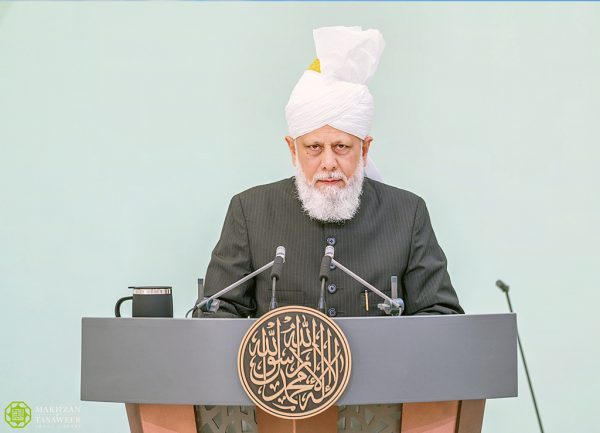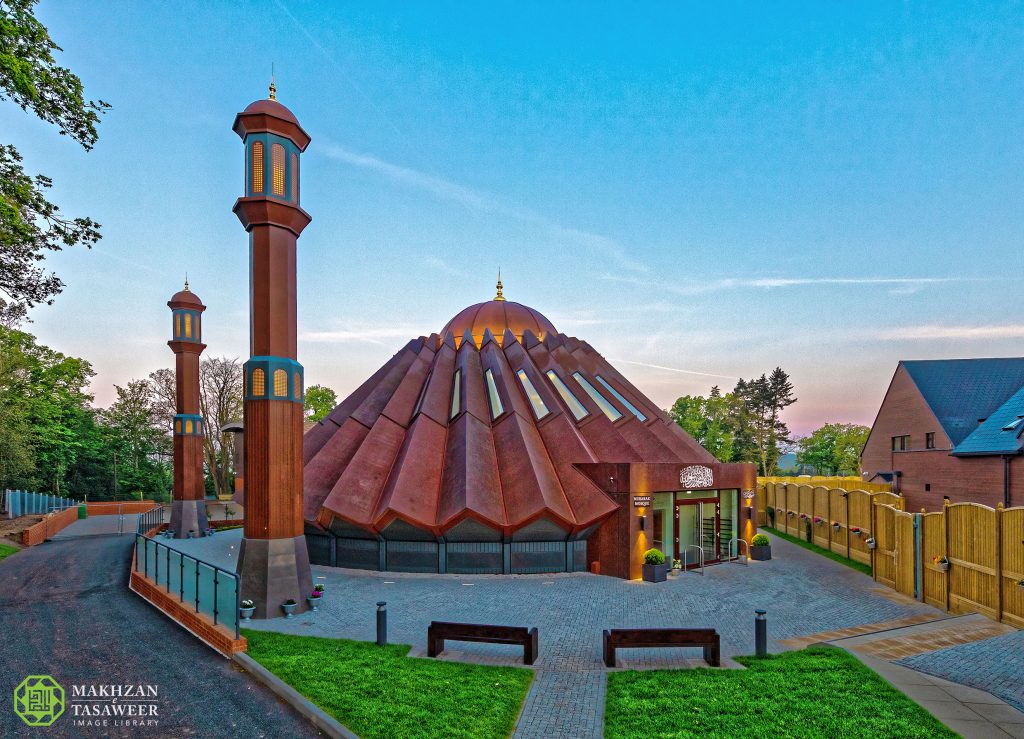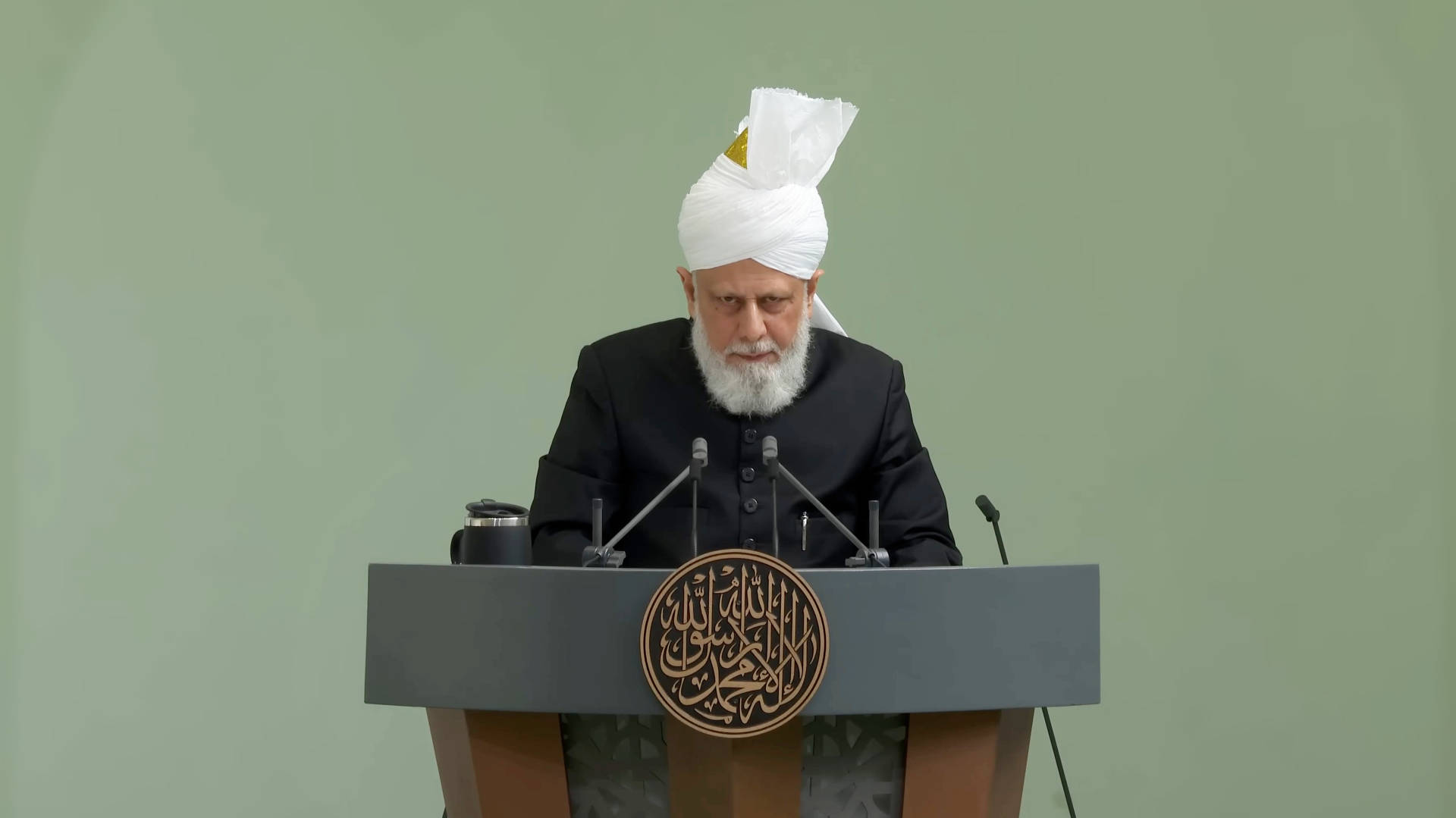After reciting Tashahhud, Ta‘awwuz and Surah al-Fatihah, His Holiness, Hazrat Mirza Masroor Ahmad (aba) said that he had been mentioning the Expedition of Hamra’ al-Asad.

His Holiness (aba) quoted Hazrat Mirza Bashir Ahmad (ra) who writes:
‘This night was a night of great fear in Madinah, because although the army of the Quraish had apparently taken to Makkah, it was apprehended that this move may be a plot to catch the Muslims off guard, and suddenly return to attack Madinah. Hence, on this night an arrangement was made for security in Madinah and the Companions particularly stood guard all night long at the residence of the Holy Prophet (sa). The next morning it was discovered that this apprehension was not mere speculation, because prior to Fajr Salat, the Holy Prophet (sa) received news that the army of the Quraish had stalled at a few miles from Madīnah and a heated debate was taking place amongst the chieftains of Makkah, that making use of this victory, why not attack Madīnah. Some of the Quraish were taunting one another saying:
“You did not kill Muhammad (sa), nor did you take the Muslim women as slaves, nor did you seize their wealth and possessions; rather, when you gained dominance over them and received the opportunity to destroy them completely, you just left them and turned back, so that they may collect strength again. There is still time, let us return and attack Madinah and uproot the Muslims once and for all.”
In contrast to this, the others argued:
“You have attained victory. Consider this to be good fortune enough and return to Makkah, lest we lose this repute as well, and this victory is turned to defeat. Now if you return and attack Madinah, the Muslims shall indeed fight with all their strength, and those who did not participate at Uḥud shall come forth in the field of battle as well.”
Ultimately, however, the opinion of the passionate ones prevailed and the Quraish prepared to set back to Madinah. When the Holy Prophet (sa) was informed of these events, he immediately announced that the Muslims should prepare, but along with this he also ordered that except for those people who had participated at Uhud, no one else should set out with them. As such, the warriors of Uhud, most of whom were wounded, tied up their wounds and betook to the company of their Master. It is written that on this occasion, the Muslims set out with such joy and zeal, as if they were a triumphant army which sets out in pursuit of the enemy. After travelling a distance of eight miles, the Holy Prophet (sa) reached Hamra’ul-Asad, where the dead bodies of two Muslims were found laying on the plain. Upon further investigation, it was discovered that these were the two spies whom the Holy Prophet (sa) had sent in the footsteps of the Quraish. Upon finding an opportunity, the Quraish had executed them. The Holy Prophet (sa) instructed that a single grave be dug, and both of them were buried together. Now that it was evening time, the Holy Prophet (sa) instructed that camp be set up at this very location. He further instructed that fires be lit at different places throughout the plain. As such, in no time, 500 fires were lit in the plain of Hamra’ul-Asad, which struck awe into the heart of any spectator from afar. Most probably, on this occasion, an idolatrous chief of the Khuza‘ah tribe named Ma‘bad presented himself before the Holy Prophet (sa) and offered his condolences for those who had fallen at Uhud, whereafter he continued on his way. On the following day when he reached Rauha’, lo and behold, he found the army of the Quraish encamped there and that preparations were underway to return to Madīnah. Ma‘bad went to Abu Sufyan at once and said:
“What are you about to do? By God, I have just left behind the army of Muhammad (sa) at Hamra’ul-Asad, and never before have I seen such an awe-inspiring army. They are so passionate due to their regret for the defeat at Uhud that they shall reduce you to ashes on sight.”
Abu Sufyan and his followers were so awe-struck by these comments of Ma‘bad, that they abandoned the idea of returning to Madīnah and made haste to Makkah at once. When the Holy Prophet (sa) received news that the army of the Quraish had fled in this manner, he thanked God and said, “This is the awe of God, which He has struck into the hearts of the disbelievers.”
After this, the Holy Prophet (sa) remained in Hamra’ul-Asad for another two or three days, and after an absence of five days, he returned to Madinah. In this campaign, two warriors from among the Quraish, one of whom was treacherous and the other a spy, were captured by the Muslims. According to the laws of war, since their punishment was death, they were executed by order of the Holy Prophet (sa). From among them, one was a renowned poet of Makkah named Abu ‘Uzzah, who was taken captive at the hands of the Muslims in the battle of Badr. On that occasion, the Holy Prophet (sa) released him without ransom upon his seeking forgiveness and promising that he would never come forth to fight the Muslims again. However, he betrayed the Muslims and participated in war against the Muslims again. Moreover, not only did he participate himself, but with his provocative couplets, he incited others as well. Hence, since the treachery of such a man could have proven to be severely injurious to the Muslims, when he was now taken captive at the hands of the Muslims a second time, the Holy Prophet (sa) ordered that he be put to death. Abu ‘Uzzah attempted to talk his way to freedom again with a verbal apology, but the Holy Prophet (sa) refused and said:
“A believer is not stung by the same hold twice.”
The second captive was Mu‘awiyyah bin Mughirah. This individual was from among the relatives of Hazrat ‘Uthman bin ‘Affan (ra), but was a staunch enemy of Islam. After the battle of Uhud, he continued to secretly circle the vicinity of Madinah, but the companions spotted him, apprehended him and presented him before the Holy Prophet (sa). Hazrat ‘Uthman (ra) interceded on his behalf and the Holy Prophet (sa) released him on the condition that he would leave within three days, otherwise he would be executed according to the punishment which was meted out to spies. Mu‘awiyyah promised that he would leave within three days, but when this time limit had expired and he was still found to be circling Madinah secretly just as before, he was executed.
History has not recorded his motive, but for someone to secretly remain in the vicinity of Madinah, and then to remain there past the stipulated term despite being warned, demonstrates that he harboured dangerous intent. It is very likely that agitated and vexed by the safe return of the Holy Prophet (sa) from the field of Uhud, he came to Madinah with some ill-motive against the very person of the Holy Prophet (sa) and planned to make a secret strike with the help of a conspiracy hatched by the Jews or idolators of Madinah. Nonetheless, God the Exalted granted His protection and his plan could not succeed.’
(The Life and Character of the Seal of Prophets (sa), Vol. 2, pp. 350-353)
Outcomes of the Battle of Uhud
His Holiness (aba) said that various historians have given their opinions about the outcomes of the Battle of Uhud. Some deem the Battle of Uhud to have been a defeat suffered by the Muslims, while there are some who say that it was defeat at first which then turned into victory. However in light of the manner of war at the time, it cannot be said that Muslims suffered defeat. In fact, the Muslims were still in the battlefield as Abu Sufyan took his army and returned to Makkah while raising slogans. One of the slogans he raised was that this was retribution for what had taken place at the Battle of Badr. But how could this be considered retribution for Badr? In Badr, the leading soldiers and chieftains of the Quraish were killed and 70 prisoners of war were taken after which the Muslims obtained a large amount in spoils. Furthermore, the Muslims remained in Badr for three more days after their victory while the Makkans fled. After the battle of Uhud, the disbelieving army didn’t do any one of these things, so then how could it be said that they were able to take revenge for their loss at Badr? The Muslims certainly did not suffer defeat in the Battle of Uhud. Though Muslim lives were lost, the Muslim army never left the battlefield, and God stopped the disbelievers from obtaining victory. In fact, the incidents of the Battle of Uhud combined with the incidents of the Expedition of Hamra’ al-Asad the following day show clearly how this was a great victory for the Muslims.
His Holiness (aba) quoted Hazrat Mirza Bashir Ahmad (ra) who writes,
‘As far as permanent outcomes are concerned, the battle of Uhud does not possess any special significance. Temporarily, however, this battle did cause harm to the Muslims in certain respects. Firstly, seventy men were martyred in this war, some of whom were among the most prominent Companions and the number of those who were wounded was also very large. Secondly, the Jews and hypocrites of Madīnah, who had become somewhat awe-stricken as a result of the battle of Badr now became relatively bold. As a matter of fact, ‘Abdullāh bin Ubayy and his supporters openly hurled mockery and taunt on this occasion. Thirdly, the Quraish of Makkah became very bold and in their hearts they began to assume that they had not only sought revenge for Badr, but even in the future, whenever they were able to collect a force and wage an attack, they could easily subdue the Muslims. Fourthly, the tribes of Arabia in general began to raise their heads with more courage. However, despite these losses, it is a clear fact that the victory at the battle of Uḥud could not compensate for the harm which had been sustained by the Quraish as a result of the battle of Badr. In the battle of Badr, all those chieftains of Makkah who in actuality, were the spirit of the Quraish’s national life, were destroyed. Moreover, as the Holy Qur’an states, this nation was uprooted in the true sense of the word. Furthermore, all of this transpired at the hands of such a nation, who in terms of apparent means was completely insignificant in comparison to them. In contrast to this, undoubtedly, the Muslims suffered in the field of Uḥud, but this loss was absolutely immaterial and temporary in comparison to the loss suffered by the Quraish at Badr. The Holy Prophet (sa), who was the focal point of the Islamic society, and was the actual target of the hostile designs of the Quraish, was alive by the Grace of God. In addition to this, all the prominent Companions, except for one or two, were all safe. Then, this defeat of the Muslims was in contestation with an army many times greater than their own in number, and far stronger in terms of equipment of war. Hence, in comparison to the magnificent triumph at Badr, the defeat of Uḥud was an insignificant thing for the Muslims, and then, in one respect, even this loss proved to be beneficial for the Muslims. For it became clear to them in the likeness of broad daylight that to tread a path in contradiction to the will and guidance of the Holy Prophet (sa) could never prove to be prosperous and beneficial. The Holy Prophet (sa) proposed to remain in Madinah and in support of this he even related a dream of his, but they insisted upon going out to fight. The Holy Prophet (sa) positioned them at a mountain pass and very emphatically instructed them not to leave their positions under any circumstances, but in the thought of collecting spoils, they vacated their positions and descended. Although this practical mistake was committed only by a small group of people, but since human society links all people in the form of a single chain; therefore, everyone suffered as a result of this weakness, just as if any benefit had been derived, all would have shared in it equally. Hence, if the defeat of Uḥud was a cause for suffering in one respect, it also served as a beneficial lesson for the Muslims in another respect. Moreover, despite having to bear this injury, the Muslims continued to race towards their final destination in the likeness of a grand flood which hits a barrier and then rebounds in the opposite direction with even greater speed.’
(The Life and Character of the Seal of Prophets (sa), Vol 2, pp. 353-355)
His Holiness (aba) said that this completes mention regarding the Expedition of Hamra’ al-Asad.

Appeal for Prayers for the State of the World
His Holiness (aba) again made an appeal for prayers regarding the state of the world, the state of Muslims and regarding Palestine. Although it seems that there may be a ceasefire for some time, the prevailing conditions indicate that even if this happens, the injustices against Palestinians won’t end. Hence, there is a great need for prayers; may Allah grant strength to the Palestinians and enable them to turn to Him.
His Holiness (aba) said that these conditions have broken the pride of the haughty. It seems that Allah the Almighty has started the process of bringing an end to their pride; it is not certain when this process will be complete – Allah knows best. However, in any case, their pride is breaking and voices are being raised from within. For example, there are protests in the USA. Although they are forcefully trying to stop these protests, and even if they are able to stop them temporarily, they will start up again.
His Holiness (aba) prayed that may Allah grant sense to the major powers of the world, that they may act with justice. They have certain standards for themselves but different standards for others. This will ultimately become the reason for the collapse of the UN.
Appeal for Prayers for His Holiness (aba)
His Holiness (aba) said that he also wishes to request prayers for himself. For some time, His Holiness (aba) had a problem with his heart valve. The doctors had been suggesting a procedure be conducted however His Holiness (aba) opted to delay it. But now, the doctors said that it would not be advisable to wait any longer. Hence, in recent days, His Holiness (aba) underwent a procedure to change the valve. By the grace of Allah the Almighty, the procedure was successful. Upon the advice of doctors, His Holiness (aba) was unable to attend the mosque for a few days. However now, by the grace of Allah the Almighty, the doctors have said that medically speaking the procedure has been successful.
His Holiness (aba) requested prayers that the entirety of his life granted by God may be an active and healthy life.
Summary prepared by The Review of Religions
